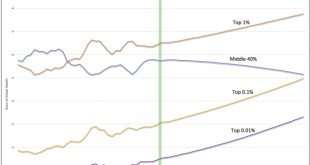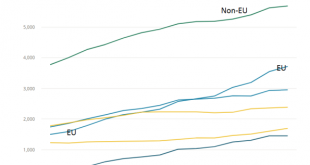from David Ruccio The premise and promise of capitalism, going back to Adam Smith, have been that global wealth would increase and serve as a benefit to all of humanity.* But the experience of recent decades has challenged those claims: while global wealth has indeed grown, most of the increase has been captured by a small group at the top. The result is that an obscenely unequal distribution of the world’s wealth has become even more unequal—and, if business as usual continues, it will...
Read More »Percentiles (repost from 2011)
I’m reposting this piece from 2011, as a prebuttal of arguments like this. I give a bit more detail here. One of the most striking successes of the Occupy Wall Street movement has been the “We are the 99 per cent” idea, and more specifically in the identification of the top 1 per cent as the primary source of economic problems. Thanks to #OWS, the fact that households the top 1 per cent of the income distribution now receive around 25 per cent of all income (up from 12 per cent a few...
Read More »Sandpit
A new sandpit for long side discussions, conspiracy theories, idees fixes and so on.
Read More »“Health expenditure”
Source: https://en.wikipedia.org/wiki/List_of_countries_by_total_health_expenditure_per_capita#/media/File:OECD_health_expenditure_per_capita_by_country.svg Source: http://fortune.com/2018/02/09/us-life-expectancy-dropped-again/ Source: https://twitter.com/beauwillimon/status/889170390949519361
Read More »Anti-Blanchard
from Lars Syll Olivier Blanchard’s intellectual path, exploring different avenues – sometimes non-linear, sometimes even contradictory – can be considered as the personification of the controversial evolution of mainstream macroeconomic research during the last three decades … Assessing this complex intellectual path, nevertheless, also helps to understand why Blanchard’s analyses are ultimately limited by the mainstream framework, and by the role he decided to play in its defense. The...
Read More »‘Free EU movement of workers’: new rules. But we need better economic policies.
Inter-EU flows of ‘labour’ have dramatically increased (figure 1, figure 2), which leads to problems in sending as well as receiving countries. New EU legislation tries to restrict the extent to which entrants can be used to circumvent existing labour laws to unfairly undercutting labour in the receiving countries (and ‘fairness’ is as fundamental an incentive to people working as their wage). This legislation is welcome. But it is too late. Or is it ‘too little’? Can sending countries...
Read More »International Financial Architecture: Part II
from Asad Zaman This is the second lecture on Understanding the Rise and Fall of the Gold Standard — shortlink: bit.do/azifa2 — we start with a Summary of First Lecture The first lecture discusses the Keynesian theory that the exact level of money in an economy is critically important – too little leads to recessions, while too much leads to inflations. Furthermore, domestic business cycles, and international financial crises are caused by pro-cyclical behavior of current artificial...
Read More »For-profit schools corrupt educational systems — lessons from Sweden
from Lars Syll Neoliberals and libertarians have always provided a lot of ideologically founded ideas and ‘theories’ to underpin their Panglossian view on markets. But when they are tested against the reality they usually turn out to be wrong. The promised results are simply not to be found. And that goes for for-profit schools too. The Swedish school system has somewhat oddly combined market principles such as decentralization, choice, competition, and corporate providers with an...
Read More »Walmart’s gamble and what it means for India
from C. P. Chandrasekhar Much of the writing on Walmart’s purchase of a dominant 77 per cent stake in Flipkart, touted for long as India’s answer to Amazon, is focused on its size. At $16 billion, of which $14 billion goes to buy up the stakes of investors such as SoftBank from Japan and Naspers from South Africa, it is reportedly the biggest acquisition in the global e-commerce area, and way larger than $3.3 billion that Walmart paid for US web retailer Jet.com in a deal considered the...
Read More » Heterodox
Heterodox





